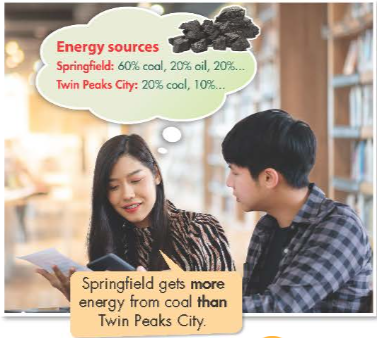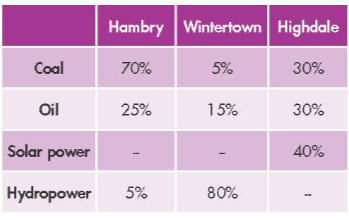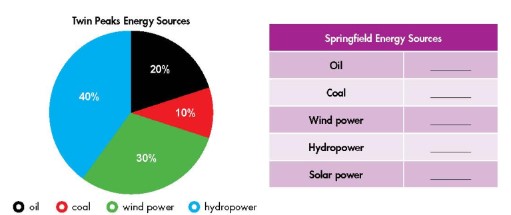Tiếng Anh 7 Unit 10 Lesson 1a. Fill in the table. Listen and repeat.b. In pairs: Discuss which renewable energy source could be useful where you live. a. Listen to Emma and James talking to experts at an energy convention.What do they want to learn about?b. Now, listen and circle True or False. c. In pairs: What sources of energy does your country use? Do you think it uses more non-renewable or renewable energy? a. Listen and repeat.b. Unscramble the sentences.c. Look at the table and write the sentences. d. In pairs: Comp GÓP Ý HAY - NHẬN NGAY QUÀ CHẤT Gửi góp ý cho HocTot.Nam.Name.Vn và nhận về những phần quà hấp dẫn
Lựa chọn câu để xem lời giải nhanh hơn
New Words a a. Fill in the table. Listen and repeat. (Điền vào bảng. Nghe và lặp lại.)
Renewable energy is "green" energy. It is clean and good for the environment. (Năng lượng có thể thay thế là năng lượng xanh. Nó sạch và tốt cho môi trường.) Non-renewable energy sources can cause pollution. (Năng lượng không thể thay thế có thể gây ô nhiễm.) Lời giải chi tiết:
New Words b b. In pairs: Discuss which renewable energy source could be useful where you live. (Theo cặp: Thảo luận những năng lượng tái tạo có thể giúp ích cho nơi bạn sinh sống.) Which energy source could we use in our town? (Năng lượng nào bạn có thể sử dụng ở thị trấn của bạn?) We could use solar power because it's really sunny here. (Chúng tôi có thể sử dụng năng lượng mặt trời vì ở đó trời nắng.) Lời giải chi tiết: A: Which energy source could we use in our town? (Năng lượng nào bạn có thể sử dụng ở thị trấn của bạn?) B: We could use solar power and wind power. (Chúng tôi có thể sử dụng năng lượng mặt trời và năng lượng gió.) Listening a a. Listen to Emma and James talking to experts at an energy convention. What do they want to learn about? (Nghe về Emma và James nói chuyện với chuyên gia ở một hội nghị năng lượng. Họ nghiên cứu về điều gì?) 1. different energy sources (các nguồn năng lượng khác nhau) 2. renewable energy sources only (chỉ những năng lượng tái tạo) Phương pháp giải: Bài nghe: Announcer: Welcome everyone to this year's Energy Convention. Emma: Hi, are you from Greenwood Energy? Michael: Yes. My name's Michael. How can I help you? Emma: How much energy does Greenwood get from coal? Michael: It gets sixteen percent from coal. Emma: Did you say sixty or sixteen? Michael: Sixteen percent. Emma: How much energy does it get from renewable sources? Michael: Fifty percent. We use lots of wind power. Emma: OK. Thank you. Michael: You're welcome. James: Hi, are you Ann from Maple Falls Energy? Ann: Yes. James: Can I ask you some questions? Ann: OK. James: How much energy does Maple Falls get from coal? Ann: Sixty percent. James: How much energy does it get from wind power? Ann: Just under three percent. James: Thank you. Hey Emma, Maple Falls gets less than three percent of its energy from renewable sources. Emma: Greenwood gets fifty percent. It uses more renewable energy sources than Maple Falls. James: So, Greenwood is greener than Maple Falls. Tạm dịch: Phát thanh viên: Chào mừng mọi người đến với Hội nghị Năng lượng năm nay. Emma: Xin chào, bạn đến từ Greenwood Energy phải không? Michael: Vâng. Tên tôi là Michael. Tôi có thể giúp bạn như thế nào đây? Emma: Greenwood lấy được bao nhiêu năng lượng từ than đá? Michael: Nó nhận được 16% từ than đá. Emma: Bạn nói 60 hay 16? Michael: 16%. Emma: Nó lấy bao nhiêu năng lượng từ các nguồn tái tạo? Michael: 50%. Chúng tôi sử dụng rất nhiều năng lượng gió. Emma: Vâng. Cảm ơn. Michael: Không có chi. James: Xin chào, bạn có phải là Ann từ Maple Falls Energy không? Ann: Vâng. James: Tôi có thể hỏi bạn một số câu hỏi không? Ann: Được chứ. James: Maple Falls lấy bao nhiêu năng lượng từ than đá? Ann: 60%. James: Nó lấy được bao nhiêu năng lượng từ năng lượng gió? Ann: Chỉ dưới 30%. James: Cảm ơn bạn. Này Emma, Maple Falls nhận được ít hơn 3% năng lượng từ các nguồn tái tạo. Emma: Greenwood nhận được 50%. Nó sử dụng nhiều nguồn năng lượng tái tạo hơn so với Maple Falls. James: Vì vậy, Greenwood xanh hơn Maple Falls. Lời giải chi tiết: Đáp án: different energy sources (các nguồn năng lượng khác nhau) Listening b b. Now, listen and circle True or False. (Bây giờ, nghe và khoanh đúng hoặc sai.)
1. Michael works for Greenwood Energy. 2. Greenwood gets 22% of its energy from coal. 3. Half of Greenwood's energy comes from renewable sources. 4. Maple Falls gets 16% of its energy from coal. 5. Greenwood uses more renewable energy than Maple Falls. Lời giải chi tiết: 1. True Michael works for Greenwood Energy. (Michael làm việc cho Năng lượng Greenwood.) Thông tin: Emma: Hi, are you from Greenwood Energy? Michael: Yes. My name's Michael. How can I help you? 2. False Greenwood gets 22% of its energy from coal. (Greenwood nhận 22% năng lượng từ than.) Thông tin: Michael: It gets sixteen percent from coal. 3. True Half of Greenwood's energy comes from renewable sources. (Một nửa năng lượng của Greenwood đến từ nguồn năng lượng tái tạo.) Thông tin: Emma: How much energy does it get from renewable sources? Michael: Fifty percent. We use lots of wind power. 4. False Maple Falls gets 16% of its energy from coal. (Tháp Maple chứa 16% từ than.) Thông tin: James: How much energy does Maple Falls get from coal? Ann: Sixty percent. 5. True Greenwood uses more renewable energy than Maple Falls. (Greenwood sử dụng năng lượng tái tạo nhiều hơn tháp Maple.) Thông tin: Emma: Greenwood gets fifty percent. It uses more renewable energy sources than Maple Falls. Listening c c. In pairs: What sources of energy does your country use? Do you think it uses more non-renewable or renewable energy? (Theo cặp: Nguồn năng lượng nào đất nước bạn sử dụng? Bạn nghĩ nó sử dụng nhiều năng lượng không tái tạo hay năng lượng tái tạo?) Lời giải chi tiết: A: What sources of energy does your country use? (Quốc gia của bạn sử dụng những nguồn năng lượng nào?) B: My country use energy from water, sun, oil and coal. (Nước tôi sử dụng năng lượng từ nước, mặt trời, dầu mỏ và than đá.) A: Do you think it uses more non-renewable or renewable energy? (Bạn có nghĩ rằng nó sử dụng năng lượng không thể tái tạo hoặc tái tạo nhiều hơn?) B: I think it use more non-renewable energy. (Tôi nghĩ nó sử dụng nhiều năng lượng không thể tái tạo hơn.) Conversation Skill Conversation Skill (Kỹ năng hội thoại) Asking for clarification (Hỏi về sự rõ ràng) To ask someone to repeat what they just said, say: (Để yêu cầu ai đó lặp lại những gì họ đã nói) Did you say (12%) or (20%)? (Có phải bạn nói là (12%) hay (20%)?) Listen and repeat. (Nghe và lặp lại.) Grammar a a. Listen and repeat. (Nghe và lặp lại.)
Energy sources (Nguồn năng lượng) Springfield: 60% coal, 20% oil, 20%... (Springfield: 60% than, 20% dầu, 20%...) Twin Peaks City: 20% coal, 10%... (Thành phố Twin Peaks: 20% than, 10%...) Springfield gets more energy from coal than Twin Peaks City. (Springfield chứa nhiều năng lượng từ than hơn thành phố Twin Peaks.) Grammar b b. Unscramble the sentences. (Sắp xếp câu.) 1. electricity/than/20%/more/Towns/use/villages. Towns use 20% more electricity than villages. (Thành phố sử dụng 20% điện nhiều hơn nông thôn.) 2. natural/Highdale/burn/gas/Does/than/Wintertown?/more 3. than/gets/Springfield/from/energy/40%/less/Twin Peaks./solar/power 4. in/use/Springfield/electricity/in/Twin Peaks./People/than/people/more 5. of/Maple Falls?/than/from/Greenwood/more/Does/get/coal/its/energy Lời giải chi tiết: 2. Does Highdale burn more natural gas than Wintertown? (Highdale có đốt cháy nhiều khí đốt tự nhiên hơn Wintertown không?) 3. Springfield gets 40% less energy from solar power than Twin Peaks. (Springfield nhận được năng lượng từ năng lượng mặt trời ít hơn 40% so với Twin Peaks.) 4. People in Springfield use more electricity than people in Twin Peaks. (Người dân ở Springfield sử dụng nhiều điện hơn người dân ở Twin Peaks.) 5. Does Greenwood get more energy of its from coal than Maple Falls? (Greenwood có nhận được nhiều năng lượng từ than đá hơn Thác Maple không?) Grammar c c. Look at the table and write the sentences. (Nhìn bảng và viết câu.) 1. Hambry/oil/Highdale Hambry gets less energy from oil than Highdale. (Hambry nhận được ít năng lượng từ dầu hơn Highdale.) 2. Highdale/coal/Hambry 3. Highdale/solar power/Wintertown 4. Hambry/coal/Highdale 5. Wintertown/hydropower/Hambry 6. Wintertown/Hambry/oil/Highdale
Lời giải chi tiết: 2. Highdale gets less energy from coal than Hambry. (Highdale nhận được ít năng lượng từ than hơn Hambry.) 3. Highdale gets 40% more solar power than Wintertown. (Highdale nhận được năng lượng mặt trời nhiều hơn 40% so với Wintertown.) 4. Hambry gets more energy from coal than Highdale. (Hambry nhận được nhiều năng lượng từ than hơn Highdale.) 5. Wintertown gets more energy from hydropower than Hambry. (Wintertown nhận được nhiều năng lượng từ thủy điện hơn Hambry.) 6. Wintertown and Hambry get less energy from oil than Highdale. (Wintertown và Hambry nhận được ít năng lượng từ dầu hơn Highdale.) Grammar d d. In pairs: Compare more information from the table. Use the prompts. (Theo cặp: So sánh thông tin từ bảng và sử dụng gợi ý.) Wintertowwn/ coal/ Hambry Highdale/ hydropower/ Wintertown
Lời giải chi tiết: Wintertown gets more energy from coal than Hambry. (Wintertown nhận nhiều năng lượng từ than hơn Hambry.) Highdale gets less hydropower than Wintertown. (Highdale nhận ít năng lượng từ thủy điện hơn Wintertown.) Pronunciation a a. Stress the first syllable for numbers which are multiples of ten. (Nhấn mạnh âm tiết đầu tiên cho các số tròn chục.) Pronunciation b b. Listen to the words and focus on the underlined letters. (Nghe từ và chú ý từ được gạch chân.) twenty sixty ninety Pronunciation c c. Listen and cross out the word that doesn't follow the note in "a." (Nghe và loại bỏ từ mà không tuân theo ghi chú ở phần a.) forty sixty Lời giải chi tiết: Đáp án: forty => sai vì nhấn vào trọng âm thứ 2. Pronunciation d d. Read the words with the correct stress to a partner. (Đọc từ với trọng âm đúng cùng với bạn của em.) Speaking a a. You're an energy expert interested in how two different cities use different kinds of energy. (Bạn là một chuyên gia quan tâm về việc hai thành phố khác nhau sử dụng những loại năng lượng khác nhau như thế nào.) In pairs: Student B, it p.123 File 11. Student A, ask about Springfield and complete the table. Swap roles. Answer questions about Twin Peaks. (Theo cặp: Học sinh B, file 11 trang 123. Học sinh A, hỏi về Springfield và hoàn thành bảng. Hoán đổi vai trò. Trả lời câu hỏi về Twin Peaks.)
Lời giải chi tiết: A: How much energy does Springfield get from oil? (Springfield nhận được bao nhiêu năng lượng từ năng lượng thủy điện?) B: It gets fifty percent from oil. (Nó nhận được 50% từ năng lượng dầu.) A: What about energy from coal? (Còn năng lượng từ than đá thì sao?) B: Springfield gets twenty percent from coal. (Springfield nhận được 20% từ than.) A: How much energy does Springfield get from wind power? (Springfield nhận được bao nhiêu năng lượng từ năng lượng gió?) B: Springfield gets five percent from wind power. (Springfield nhận được 5% từ năng lượng gió.) A: How much energy does Springfield get from hydropower? (Springfield nhận được bao nhiêu năng lượng từ năng lượng thủy điện?) B: Springfield gets five percent from hydropower. (Springfield nhận được 5% từ năng lượng thủy điện.) A: How much energy does Springfield get from solar power? (Springfield nhận được bao nhiêu năng lượng từ năng lượng mặt trời?) B: Springfield gets twenty percent from solar power. (Springfield nhận được 20% từ năng lượng mặt trời.)
Practice Ask and answer. Then, compare energy sources in Bigton and Greenville. Swap roles and repeat. (Hỏi và trả lời. Sau đó, so sánh các nguồn năng lượng ở Bigton và Greenville. Hoán đổi vai trò và lặp lại.)
How much energy does Bigton get from solar power? (Bigton nhận được bao nhiêu năng lượng từ năng lượng mặt trời?) It gets three percent from solar power. What about Greenville? (Nó nhận được 3% từ năng lượng mặt trời. Còn Greenville thì sao?) Greenville gets one per cent from solar power. (Greenville nhận được 1% từ năng lượng mặt trời.) Greenville gets less energy from solar power than Bigton. (Greenville nhận được ít năng lượng hơn từ năng lượng mặt trời so với Bigton.) Lời giải chi tiết: A: How much energy does Bigton get from hydropower? (Bigton nhận được bao nhiêu năng lượng từ năng lượng thủy điện?) B: It gets seven percent from hydropower. What about Greenville? (Nó nhận được 7% từ năng lượng thủy điện. Còn Greenville thì sao?) A: Greenville gets forty one percent from solar power. (Greenville nhận được 41% từ năng lượng mặt trời.) B: Greenville gets less energy from hydropower than Bigton. (Greenville nhận được ít năng lượng hơn từ năng lượng thủy điện so với Bigton.) *** B: How much energy does Bigton get from coal? (Bigton nhận được bao nhiêu năng lượng từ than đá?) A: It gets twenty one percent from coal. What about Greenville? (Nó nhận được 21% từ than đá. Còn Greenville thì sao?) B: Greenville gets thirty eight per cent from coal. (Greenville nhận được 38% từ than đá.) A: Greenville gets more energy from coal than Bigton. (Greenville nhận được nhiều năng lượng hơn từ than đá so với Bigton.) Speaking b b. Compare the energy sources for Twin Peaks and Springfield. Which city uses more renewable energy? (So sánh nguồn năng lượng giữa Twin Peaks và Springfield. Thành phố nào sử dụng nhiều năng lượng tái tạo hơn?) Lời giải chi tiết: Twin Peaks city uses more renewable energy than Springfield. (Thành phố Twin Peaks sử dụng nhiều năng lượng tái tạo hơn Springfield.)
>> Học trực tuyến lớp 7 trên Tuyensinh247.com. Đầy đủ khoá học các bộ sách: Kết nối tri thức với cuộc sống; Chân trời sáng tạo; Cánh diều. Cam kết giúp học sinh lớp 7 học tốt, hoàn trả học phí nếu học không hiệu quả. PH/HS tham khảo chi tiết khoá học tại: Link
|
||||||||||||||||||||||
























